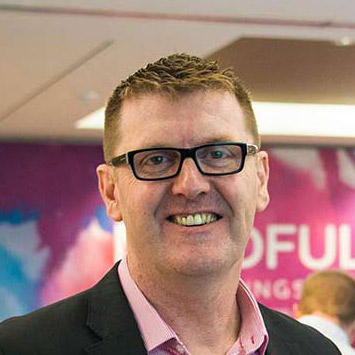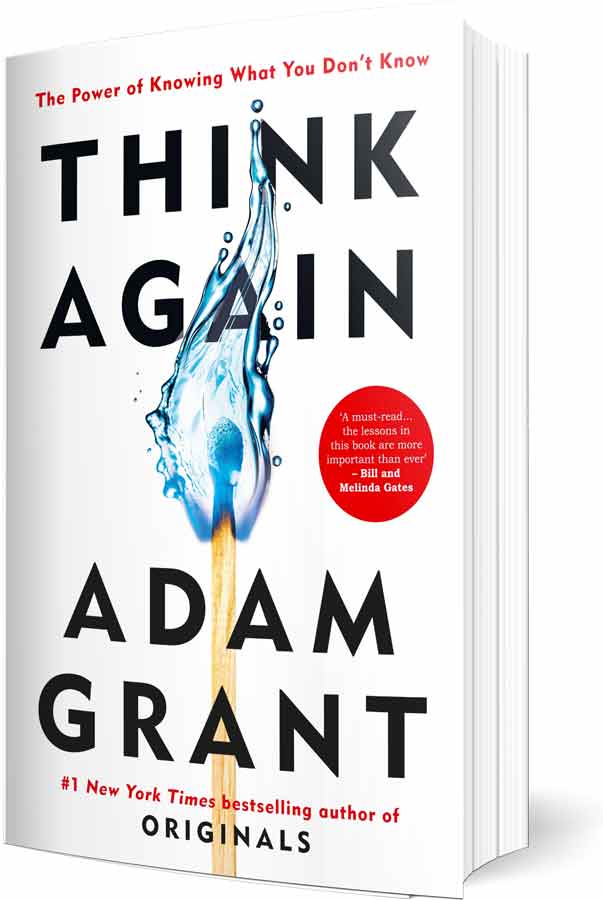Think Again
The Power of Knowing What You Don't Know
Adam Grant is an American psychologist, New York Times bestselling author of Originals and Give and Take, and is currently a professor at the Wharton School at the University of Pennsylvania.
I’m a big fan of Grant’s work and if you are not aware of him, I would recommend you start reading his books or at least jump onboard with his podcasts, TED Talks, newsletter, articles, etc.
Grant’s latest book Think Again was released in 2021. His essential premise is that the more intelligence and expertise you have, the less willing you are to admit the limitations of your thinking. Grant states that ‘being good at thinking can make you worse at rethinking’.
In the more stable environments of the past, we were typically rewarded for our ability to think, learn, having convictions and doubling down with our ideas, where we could take pride in our knowledge and expertise.
However, Grant states that this traditional approach no longer works in our rapidly changing world, as we need to spend more time rethinking to stay relevant and adapt our thinking to our radically changing environments.
“In a turbulent world, there’s another set of cognitive skills that might matter more: the ability to rethink and unlearn”.
Grant implores us to embrace the power of acknowledging what we don’t know and be prepared to unlearn by rethinking. In fact, the case studies, research, and stories Grant shares, tell us that ‘the most innovative thinkers don’t just accept when they are wrong, they take genuine pleasure in it, and delight in having their intellectual world rocked’. But unfortunately, this is rare.
Rethinking Threatens Our Identities
Part of the challenge for us to learn how to be good at ‘rethinking’ is that we suffer from ‘cognitive laziness’ where we hang onto old views because it is comfortable and it worked for us in the past. However, Grant argues there are deeper and darker forces behind our resistance to rethinking because ‘questioning ourselves makes the world more unpredictable’ and by rethinking ‘something we deeply believe can threaten our identities, making it feel as if we’re losing a part of ourselves’.
Below are a few of my favourite rethinking concepts from Grant’s book that I believe are game changing and critical for us to adopt to help us thrive in the disruptive world we now live in.
The Preacher, Prosecutor or Politician mindsets. Pick your poison!
One of my favourite concepts from his book is avoiding the temptation and the danger of slipping into one of these three Preacher, Prosecutor or Politician thinking mindsets.
- Preacher – where we hold onto our ‘sacred beliefs’ and we deliver sermons to protect (or to promote) our ideals.
- Prosecutor – where we go on the attack and look for the flaws in other people’s reasoning while we marshal strong arguments to prove ourselves right, and them wrong, so we can win our case.
- Politician – where we’re seeking to win over an audience and campaign to lobby for the approval of our people and stakeholders.
What’s amazing on reflection, is how often at work and in life we adopt one of these three identities, which then dictates the way we think, talk, argue and ultimately become, as a person. This then comes at the cost of being curious, innovative, and being open and collaborative with new ideas and fresh ways to move forward to remain relevant.
“The risk is that we become so wrapped up in preaching that we’re right, prosecuting others who are wrong, and politicking for support that we don’t bother to rethink our own views.”
A Different Pair of Goggles – Think Like a Scientist
The antidote to stop us falling into one of the Preacher, Prosecutor or Politician mindsets, is putting a ‘different pair of goggles on’ and start rethinking (or thinking) like a scientist. ‘If you’re a scientist by trade, rethinking is fundamental to your profession. You’re paid to be constantly aware of the limits of your understanding. You’re expected to doubt what you know, be curious about what you don’t know, and update your views based on new data.’
The key to taking on the ‘thinking like a scientist’ approach is where you favour ‘humility over pride, doubt over certainty, curiosity over closure’ while trying to avoid our human fragility of pride and becoming that ‘over confident’ expert.
Two types of thinking cycles
Compare Grant’s ‘rethinking cycle’ that he recommends that we all adopt to the traditional expert ‘overconfident cycle’.
The Rethinking Cycle:
- Humility – Doubt –
- Curiosity – Discovery
The Overconfident Cycle:
- Pride – Conviction – Confirmation
- (& Desirability Biases) – Validation
The Rethinking Cycle is a compelling model to embrace but we can see how challenging it is to let go of our pride as the starting premise of our rethinking mindset! Especially when we are known experts.
Rethinking Means More Conflict
“The absence of conflict is not harmony, it’s apathy.”
The key concept or discovery that I loved from Grant’s book is around the Psychology of Constructive Conflict and why groups that have more conflict (but the right sort of conflict) are higher performers, they innovate more, and they pivot more. That’s because these teams adopt ‘task conflict’ as a positive approach to tackling problems by seeking creative solutions.
“Being able to have a good fight doesn’t just make us more civil; it also develops our creative muscle.”
Whereas ‘relationship conflict’ is where people clash with one another and get personal. This approach is simply destructive and stands in the way of rethinking. Even worse is when people avoid conflict all together and go passive, which results in low performing groups that rarely pivot or innovate.
The Danger of Too Much Grit
The final concept that I want to highlight is where Grant challenges the reader to be very wary of the notion of ‘grit’. Rather than rethinking when things go wrong, most people ‘double down and sink more recourses’ into their endeavours. This ‘escalation of commitment’ pattern of thinking is a ‘major factor in preventable failures’ which Grant argues is ‘fuelled by one of the most celebrated engines of success: Grit.’
Grit is a combination of passion and perseverance, but grit has a dark side! As research shows that ‘gritty people’ overplay the odds, take seriously dangerous risks, and continue to stay the course even when things are failing and have no chance of success.
“There’s a fine line between heroic persistence and foolish stubbornness.”
Grant’s book is such a timely call out to why we all need to be careful of our cognitive errors, biases, prejudices, and mental blind spots. Where we so often fail to change our ideas once established. Which leads us to having closed-minded attitudes, poor future decision-making, inflexibility, and an inability to hear others.
Rethinking is what Grant’s describes as ‘confident humility’ which is a corrective lens to help see more clearly and gain ‘joy’ in being wrong. As Grant states, ‘great thinkers don’t harbor doubts because they’re imposter’. They maintain their doubts because we are ‘all partially blind’ so we all need to be committed to improving our sight.
People who embrace rethinking as a mindset, ‘don’t boast about how much they know; they marvel at how little they understand’. Which is a mark of a lifelong learner, ‘recognizing that they can learn something from everyone they meet’.
As a leadership educator and someone who is passionate about lifelong learning and reinventing yourself, your teams, and your workplaces, I loved reading Grant’s book as it challenged me personally and professionally to continually rethink and embrace the joy of unlearning.
“A hallmark of wisdom is knowing when it’s time to abandon some of your most treasured tools and some of the most cherished parts of your identity.”

Book review by:
Richard Dore - CEO, Proteus Leadership


